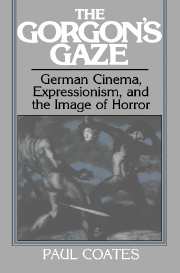Book contents
- Frontmatter
- Contents
- Preface
- Acknowledgments
- Introduction: The uncanny and the gorgon's gaze
- I Silent cinema and expressionism
- II The sleep of reason: Monstrosity and disavowal
- III Memory and repression in recent German cinema
- IV Expressionism in America
- V Elective affinities and family resemblances: For Margarethe von Trotta
- Appendixes
- Notes
- Selected bibliography
- Filmography
- Index
IV - Expressionism in America
Published online by Cambridge University Press: 21 October 2009
- Frontmatter
- Contents
- Preface
- Acknowledgments
- Introduction: The uncanny and the gorgon's gaze
- I Silent cinema and expressionism
- II The sleep of reason: Monstrosity and disavowal
- III Memory and repression in recent German cinema
- IV Expressionism in America
- V Elective affinities and family resemblances: For Margarethe von Trotta
- Appendixes
- Notes
- Selected bibliography
- Filmography
- Index
Summary
It is often claimed that there are two tendencies in film history: on the one hand, realism, transparent reproduction of the world's appearances; and on the other the stylization and distortion associated with expressionism. The assumption – subscribed to, for instance, by Kracauer – is that realism is the more virtuous of the two. (In Bazin's terms, mise-en-scène and deep focus are to be preferred to montage.) It would however be too large a generalization to subsume expressionism under stylization; if this were the case, then Von Sternberg would be an expressionist. Expressionism's legacy is in fact the use of stylization to indicate the state of the mind viewing the world. A vindication of expressionism might argue that it does so in order to counteract the reifying behaviorism of the camera – the result being a fusion of the objective and the subjective that allows one to view both a figure moving through the world and the way that figure perceives the world. Expressionism in film thus becomes profoundly dialectical, and is far from a simple negation of realism – a term that is itself far more multivalent and problematic than its proponents like to admit.
- Type
- Chapter
- Information
- The Gorgon's GazeGerman Cinema, Expressionism, and the Image of Horror, pp. 156 - 192Publisher: Cambridge University PressPrint publication year: 1991

